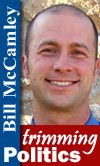By Bill McCamley
So I’ve been thinking a lot lately about the government’s bailout of Wall Street, and whether or not it is a good thing. As much as I’ve tried, it has been very difficult to come up with a definitive opinion. On one hand, without this action the amount of credit available for everything from student loans to mortgages to small businesses will be completely cut off. This would probably lead the economy to a grinding halt. On the other hand, I share the reservations of many that bailing out the greedy Wall Street fat cats responsible for much of this problem is not right. Furthermore, I’m no communist, and I do not think that the proper role of government in a market economy is to run the very platform on which most business is based.
However, there is one thought that I am sure of that comes to mind every time I see news regarding the situation: This problem is the result of a long string of events and is going to require a more massive change in our society than many of us might be comfortable with right now.
The problem starts in
For example, check out this story about Rep Tom Davis, a moderate Republican from northern
Lessening partisanship
This combination of partisanship and the insulation of living in
First, there must be term limits. I have heard so many people talk about how ideological politicians are when they go to
There are two arguments against term limits. The first is that people will not have time to get things done if they are limited. Well, if 10-year term limits for the House and 18-year limits for the Senate are implemented and someone can’t get anything done in that amount of time, he or she is ineffective and should be shown to the curb anyway. Second, arguments abound that if term limits are implemented lobbyists and staffers that stay in
Besides, don’t lobbyists and staffers already have a ton of power now?
The second thing we must implement is a new way of setting up Congressional districts. Though gerrymandering for various reasons is nothing new, the blatant process of drawing districts to get certain parties elected has become worse and worse, until we had the famous mid-decade reshuffle in Texas a couple of years ago. This strategy forces a couple of things to happen: More partisan people are elected to office, and leaders end up coming from some of the most partisan districts in the country (ie.
Efforts like that in Iowa are ones that more states should follow to make races more competitive. This would make officials more interested in results than partisanship electable.
Change will require public pressure
Though these issues make sense, and many Americans probably agree with them, they will never get implemented without massive pressure by the public. Why? Because applying these policies is not in the interests of ingrained politicians whose whole goal is to gain power and use it to maintain their positions.
Simple enough, but why aren’t people more interested in these ideas? Because they aren’t “sexy.” Issues like abortion, gun control and immigration stir interest and passion and easily take precedence in most citizens’ minds during any election. Term limits, redistricting and other ideas like campaign finance reform, though probably more effective at getting resolutions to these issues, just can’t cut through the excitement generated by these more fervent subjects and are therefore thrown to the backseat.
If we can’t get fundamental change, though, the problems with the economy will be just the tip of the iceberg. The deficit, health care, and increased environmental problems will also become more serious in the near future, and unless we can figure out a better way of dealing with them on a federal level with good government, we will all regret it.
By the way, why is Bill Clinton so much cooler than W? He did this at the end of his term. Hilarious. I doubt Bush would have the self confidence to do anything similar.
McCamley is the District 5 Doña Ana County commissioner.
